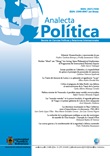Ni la “mente” ni las “cosas” sino actuar: algunas implicaciones filosóficas del Pragmatismo para la investigación en Relaciones Internacionales
Contenido principal del artículo
Resumen
La investigación en la disciplina de las Relaciones Internacionales ha estado dominada por el positivismo. La filosofía de la ciencia positivista ha sido útil para la investigación pero ha tenido un costo: la ansiedad cartesiana. Es decir, la búsqueda de la certeza absoluta, con las exigentes asunciones que esto implica. A la luz de tan cuestionables estándares, se presenta al pragmatismo como una alternativa prometedora. Este acercamiento rechaza la búsqueda de la ‘verdad’ y en su lugar propone un enfoque en la ‘asertabilidad garantizada’. Por tanto, toma en serio el carácter preliminar del conocimiento. Consecuentemente, se arguye que el pragmatismo puede atender las limitaciones del positivismo. Al hacerlo, este ejercicio hace un llamado para el pluralismo, no para una nueva ortodoxia.
Referencias
Ayer, A. (1959). Editor’s Introduction. In A. Ayer (ed.), Logical Positivism (pp. 3-30).
Glencoe, US: The Free Press.
Bacon, M. (2012). Pragmatism, an introduction. Cambridge, UK: Polity.
Bernstein, R. (1983). Beyond Objectivism and Realism: science hermeneutics and praxis.
Philadelphia: University of Pennsylvania Press.
Caldwell, B. (1994). Beyond Positivism. Economic Methodology in the Twentieth Century.
New York, US: Routledge.
Cochran, M. (2002). Deweyan Pragmatism and Post-Positivist Social Science. IR. Millennium – Journal of International Studies, 31(1), 525-548.
Cochran, M. (2012). Pragmatism in International Relations: A story of Closure and Opening. European Journal of Pragmatism and American Philosophy, 4(1), 138-158.
Comte, A. (2009). A General View of Positivism. New York, US: Cambridge University Press.
Dewey, J. (1985). The Middle Works of John Dewey 1899-1924 (Vol. 12). Carbondale, US: Southern Illinois University Press.
Dewey, J. (2008a). The Later Works of John Dewey 1925-1953 (Vol. 4). Carbondale, US: Southern Illinois University Press.
Dewey, J. (2008b). The Later Works of John Dewey 1925-1953 (Vol. 5). Carbondale, US: Southern Illinois University Press.
Descartes, R. (1956). Discourse on Method. New York: Pearson.
Descartes, R. (1993). Meditations on first philosophy (3rd ed.). Indianapolis, US: Hackett Publishing Company
Dicker, G. (1998). Hume’s Epistemology and Metaphysics: an introduction. New York, US: Routledge
Feilzer, M. (2010). Doing Mixed Methods Research Pragmatically: Implications for the Rediscovery of Pragmatism as a Research Paradigm. Journal of Mixed Methods Research, 4(1), 6-16.
Friedrichs, J. (2009). From Positivist Pretense to Pragmatic Practice, varieties of Pragmatic Methodology in IR Scholarship. International Studies Review, 11, 645-648.
Friedrichs, J., & Kratochwil, F. (2009). On acting and Knowing: how pragmatism can advance International Relations research and methodology. International Organization, 63, 701-731.
Jackson, P. (2011). The Conduct of inquiry in International Relations, philosophy of science and its implications for the study of world politics. New York, US: Routledge
James, W. (1977). The Writings of William James: A Comprehensive Edition (J. J. McDermott, Ed.). London: University of Chicago Press.
Kaboub, F. (2008). Positivist Paradigm. In F. Leong (ed.), Encyclopedia of Counseling (p. 785).
King, G., Keohane, R., & Verba, S. (1994). Designing Social Inquiry: Scientific inference in qualitative research. New Jersey, US: Princeton University Press.
Kratochwil, F. (2007). Of False Promises and Good Bets: a plea for a pragmatic approach to theory building (the Tartu lecture). Journal of International Relations and Development, 10, 1-15.
Kratochwil, F. (2011). Ten points to ponder about Pragmatism. In H. Bauer & E. Brighi (eds.), Pragmatism in International Relations (pp. 11-25). New York, US: Routledge.
Krauss, S. (2005). Research Paradigms and Meaning Making: A Primer. The Qualitative
Report, 10(4), 758-770.
Kuhn, T. (1970). The Structure of Scientific Revolutions (2nd ed). Chicago, US: University of Chicago Press.
Menand, L. (1997). Pragmatism: A Reader. New York: Vintage Books.
Misak, C. (Ed.) (2007). New Pragmatists. Oxford: Clarendon Press.
Misak, C. (2013). The American Pragmatists. Oxford: Oxford University Press.
Morgan, D. (2007). Paradigms Lost and Pragmatism Regained: Methodological Implications of Combining Qualitative and Quantitative Methods. Journal of Mixed Methods Research, 1(1), 48-76.
Peirce, C. (1905). What Pragmatism is. The Monist, 15(2), 161-181.
Popper, K. (2002a). The Logic of Scientific Discovery. New York, US: Routledge.
Popper, K. (2002b). Conjectures and Refutations. New York, US: Routledge.
Quine, W. (1980). From a Logical Point of View: 9 Logico-philosophical Essays (2nd ed.).
Cambridge: Harvard University Press.
Quinton, A. (2010). Inquiry, thought and action: John Dewey’s theory of knowledge. In R.S. Peters (ed.), John Dewey Reconsidered (pp. 1-11). New York, US: Routledge.
Riley, D. (2007). The Paradox of Positivism. Social Science History, 31(1), 115-126.
Rorty, R. (1979). Philosophy and the Mirror of Nature. New Jersey, US: Princeton University Press.
Rosenberg, A. (1993). Hume and the philosophy of science. In D. Norton (ed.), The Cambridge Companion to Hume (pp. 64-89). New York, US: Cambridge University Press.
Smith, S. (1996). Positivism and Beyond. In S. Smith, K. Booth & M. Zalewski (eds.), International Theory: Positivism and Beyond (pp. 11-44). Cambridge, UK: Cambridge University Press.
Stiglitz, J., Sen, A. & Fitoussi, J-P. (2010). Mis-measuring Our Lives, why GDP doesn’t add up. The Report by the Commission on the Measurement of Economic Performance and Social Progress. London, UK: The New Press.
Suppe, F. (1977). Afterword. In F. Suppe (ed.), The Structure of Scientific Theories (2nd ed., pp. 617-730). Urbana, US: University of Illinois Press.
Talisse, R., & Aikin, S. (2011). Introduction. In R. Talisse & S. Aikin (eds.), The Pragmatism Reader (pp. 4-11). New Jersey, US: Princeton University Press.
Uebel, T. (2014). Logical Empiricism. In M. Curd & S. Psillos (eds.), The Routledge Companion to Philosophy of Science (2nd ed., pp. 90-103). New York, US: Routledge.
Waugh, J., & Ariew, R. (2008). The History of philosophy and the philosophy of science. In M. Curd & S. Psillos (Eds.), The Routledge Companion to Philosophy of Science (2nd ed., pp. 27-38). New York, US: Routledge.






